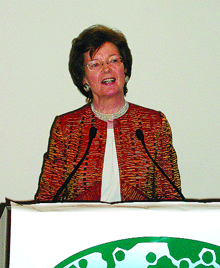The International Gay and Lesbian Human Rights Commission honors three women
Dressed in a pink plaid shirt and dress slacks, her hair in thin braids, Fadzai Muparutsa could easily pass as another New York lesbian of color, out for a good time on a Friday night. But this 25-year-old activist takes her safety in her own hands every time she leaves her home in her native land. Muparutsa is head of the gender advocacy program of the Gays and Lesbians of Zimbabwe, a group that fights for gay rights and visibility in a country whose president, Robert Mugabe, openly refers to gays as “dogs and pigs.”
Muparutsa was one of the activists honored with the International Gay and Lesbian Human Rights Commission’s Felipa de Souza Award at the organizations 15th anniversary celebration at the Union Square Ballroom on May 13. IGLHRC also honored Mary Robinson, the former president of Ireland and United Nations high commissioner for human rights, as well as IGLHRC founder Julie Dorf.
Said Muparutsa, her organization’s main advocacy issues are HIV/AIDS, the visibility of women’s rights and issues of economic equality. Muparutsa said that Gays and Lesbians of Zimbabwe is fortunate to have its own center, where people find a safe space, and where they pick up condoms, dental dams and lubricant—the “simple things we need to keep us safe. Because the biggest thing we have is the HIV/AIDS campaign.”
She estimated that a third of adults in Zimbabwe are HIV-positive. “The most unfortunate thing about it is when the statistics come out from the government and organizations working with HIV/AIDS the numbers are so distorted,” said Muparutsa. “But I actually think it’s getting worse in Zimbabwe because it’s difficult to say that you’re seeking treatment. The stigma is still really high, and so is the discrimination against people with HIV and AIDS. And maybe that’s the reason why the statistics are as distorted as they are.”
Muparutsa’s efforts to draw more visibility to the devastating effects of the epidemic are hampered by a government that has outlawed public demonstrations without a permit. “You actually have to go to the police before you do a demonstration and let them know you are doing a demonstration or march to get a permit,” she said. “And we won’t have that space—it won’t be granted. And if they do, they will revoke it before it happens. And when we do go out into the street and demonstrate against something, people are likely to get arrested.”
Arrest, job loss, threats to one’s home and children “are the real-life risks. Those are it,” said Muparutsa. “And you might not get arrested, but you know that someone’s watching you every day of your life. I think the fear that that breeds within us makes it difficult for that person to even go outside their door, to participate in anything, even if it’s something that’s right.”
For example, said Muparutsa, on the recent eve of election results, Women of Zimbabwe, a group social justice organization, went to demonstrate at a park. “Before they had even gotten started—and I think there was about 30, maximum—they got arrested. And people won’t come out because they know there is a risk of getting arrested.”
An international figure, Mary Robinson also worked in a nation known for its intolerance of homosexuality, but went on to help pass laws in Ireland decriminalizing sex between members of the same sex.
Later on, Robinson joined Human Rights Watch in submitting an amicus brief in the 2003 Lawrence v. Texas Supreme Court arguments that struck down sodomy laws in the United States. “I was very pleased to be associated with the brief, because it was a very well-argued case about how the international community has been addressing these issues,” Robinson said during an interview at the awards ceremony. “And it’s good in the United States to be aware of these issues have also been faced by other countries. And I think that it is a bit troubling that there is such a resentment that the courts in the United States would look to international jurisprudence. In my view, it’s a mature strength to look to others in the same situation.”
Julie Dorf, an IGLHRC founder 15 years ago, said she first became involved in gay international human rights as a student of Russian and Soviet studies. Appalled that thousands of Russians were being imprisoned for adult, consensual, sexual relations, she began working with others “to help, on the citizen-to-citizen level, and influence the bigger movement to be more inclusive to issues of sexual orientation, AIDS and HIV.”
Dorf described Robinson as “a very wonderfully outspoken supporter for equality for gay people back in the early ‘80s,” adding, “Very few leaders of nations in this world are as supportive as she.”
“Thankfully, the U.S. isn’t run by Robert Mugabe, but at the same time having religious extremists take over with a plan of intolerance for gay rights is disconcerting,” said Dorf.
gaycitynews.com



































